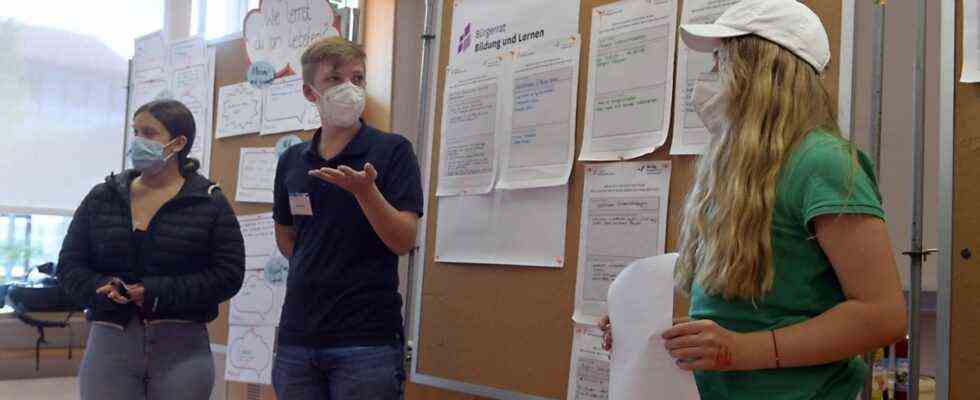What would students change if they could be the head of their school for a day? The seventh graders at the Kirchheimer Gymnasium have a clear idea of ideal learning conditions: Lessons shouldn’t start at 8 a.m., after all, several studies have shown that children are only productive later in the day. Often the pressure to perform is enormous, so there should be fewer written grades. And since the classroom is not always the best place to immerse yourself in a topic, there should be more field trips.
There is a lot of discussion about how to improve education. Experts are interviewed, educators, politicians – but rarely do those who are directly related to the topic have their say. To change that, the non-profit foundation group Montag Foundations has organized several youth workshops at different types of schools throughout Germany. The Kirchheim seventh graders were among the five classes in Germany that were allowed to take part in the campaign.
The youth workshops are part of a larger project that collects ideas and suggestions for improving education, as Gerhard Wolff, communications officer from the Montag Foundations, explains. According to him, 400 adults have already discussed the topic in a digital conference. Their findings are to be concretized in a citizens ‘council consisting of 100 participants in the autumn – the pupils’ suggestions are to be incorporated here. According to Wolff, the aim is to work out specific suggestions for improvement, which are then ultimately passed on to politicians.
Three large boards were set up in the classroom in the Kirchheimer Gymnasium. On one of them, the students have already noted how they like to learn – alone or with friends, with breaks or continuously. In small groups, they focused on the question that was attached to a sign on the second board: What would you change at your school to make learning fun? “There should be more understanding for the students,” says 13-year-old Lena. “Questions should be answered even if they have already been asked.” Because sometimes you didn’t understand something exactly and wanted to reassure yourself – but then the teacher often thought you weren’t paying attention. “The overall education system would have to be changed,” adds her classmate Sebastian. “More general knowledge should be imparted, as well as practical skills such as cooking.”
According to Lilly Nürnberger, she is not surprised by the creativity and commitment of the students: At the Kirchheimer Gymnasium, participation has always been important, as the deputy headmistress explains. There are regular surveys and evaluations at the school, in which the children and young people can contribute. According to Nürnberger, some of the results have already been implemented. “This is how school should be, you also have to ask the students.” Of course, some ideas are utopian – a seventh grader had suggested at the youth workshop that lessons should take place at night and a two-hour break to sleep. But that is irrelevant, the goal is ultimately to be able to let your thoughts run free. Nürnberger himself considers many of the suggestions to be recommendable, such as reducing the number of written performance assessments: “I would be there straight away so that the children have more time to study for the individual exams.”
The many suggestions that the Kirchheim seventh graders have worked out should now be concretized by Lena and Rüja as the project progresses. As ambassadors for their school, the two 13-year-olds will travel to Berlin in autumn, where they will discuss with the adults on the Citizens’ Council and contribute their point of view. “It’s exciting to be able to do something for others,” says Lena. “There are so many important things that need to be improved, for example digitization.” Her classmate Rüya is also looking forward to the opportunity to make a contribution to the students all over Germany: “With the project we can be creative and let out our own ideas. Otherwise there is hardly any possibility.” Do you think that the politicians will actually accept and implement your proposals? “I am confident,” says Lena.

